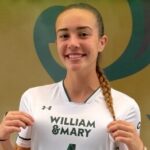Brian Pensky ‘chasing it’ in late recruiting charge upon arrival at Tennessee
By Charles Boehm
Richmond, Va. – Brian Pensky has a long way to go, and not much time to get there.
The charismatic coach made headlines earlier this year when he departed his position as the University of Maryland’s head women’s soccer coach to take over the women’s program at the University of Tennessee, drawn by the southern school’s persistent pursuit, substantial salary offer and dramatically larger operating budget.
The decision capped a seven-year stint in College Park wherein he built the Terrapins into a national contender, and underlined his ambition as well as that of Tennessee’s athletic department, which persistently pursued Pensky as the preferred successor to Angela Kelly. After 12 years in charge in Knoxville, Kelly moved on to the University of Texas last December.
It also put Pensky behind the eight-ball in terms of the recruiting cycle at his new school, which just as relentless in women’s soccer as it has long been in other NCAA sports, with top players usually locked down at least two years in advance of their high school graduation and major programs dueling over the best talent from what has become a truly national elite youth club scene.
“I guess the best word I can use to describe it is, it’s a chase,” said Pensky in an exclusive conversation with The Soccer Wire at the Jefferson Cup in Richmond, Va. on Saturday. “I’m kind of going field to field and team to team, just trying to see who’s still available for 2013 that I think could maybe help us, and trying to develop a list of really top-level ‘14s and beyond.
“Obviously it’s tireless – I’m in Richmond right now and I have a 5:45 flight to Houston tomorrow morning. I’m on the road again next weekend – like I say, chasing it. But I’m having fun and seeing good players and very confident that we’re going to be great at Tennessee.”
He’s basically inherited the five members of Kelly’s 2012 recruiting class, with one addition of his own – New Zealand national teamer Hannah Wilkinson, who had verbally committed to Maryland “sight unseen” before deciding to follow Pensky to Knoxville. But at Division I level, the most sought-after recruits for 2013 and even 2014 are being signed up at this point in the calendar, prompting him to dig deeper and venture off the beaten path to find promising players at the Under-16 and U-17 levels who are not yet committed.
“Right now, because I’m on such a hunt, a chase, I don’t care what field, what level, what club – anything. I just want to go find players,” he explained. “You never know. Recruiting is an art. Anybody can spot and identify the top kids. That’s easy.
“Now, who can maybe find – what I’m finding I need to do for my ‘13s – who can find that diamond in the rough? That kid that maybe looks a little bit interesting, and you project a year or two down the road, and you know what, she’s going to grow up, she’s going to go from being a little girl to being a woman, and she’s going to be pretty good. Whether it’s on a club team that doesn’t get a whole lot of recognition or isn’t one of the bigger-name ECNL teams, I’ve identified kids this weekend, within that ’13 class, that I’m excited to go after, that I think will help us win at Tennessee.”
Noting that many parents like to see their daughters pick college programs within reasonable driving distance of home so they can continue to watch them play, Pensky mentions a “four-hour pocket” around Knoxville, an area of recruiting importance encompassing soccer hotbeds in Ohio, Georgia, the Carolinas and the mid-South. But he’s still thinking on a nationwide basis and last month hired an old friend and veteran West Coast coach, former Loyola Marymount (Calif.) boss Joe Mallia, as his first assistant, with an eye towards exploring California’s blue-chip club scene.
“I think that Tennessee is very much a national brand. Not that Maryland wasn’t, because Maryland is a national brand, and we could recruit from all over, especially within the ACC, being attractive like it is,” noted Pensky. “But there’s something about Tennessee that I think is a little bit more unique in being able to try to pull kids from different areas. So I’m certainly casting a pretty wide net.
“What’s great about Knoxville is that Knoxville, Tennessee is all about the University of Tennessee. People here are so passionate about their school, and as the president of the University of Maryland used to say, if you describe your university as a home, athletics and the athletic department is the front porch of that home. When people describe their passion and affection and affinity, it’s Tennessee athletics, and it really doesn’t matter what sport. Last weekend our softball team hosted the University of Florida – three straight sellouts in our softball stadium. The game is in the radio in Knoxville, and not just campus radio, where you can only pick it up on your dorm room in your computer.”
His move to Tennessee, who play in a new, multi-million-dollar stadium of their own and are well-funded thanks to the university’s rabidly supportive alumni base and forward-leaning attitude about athletic success, reflects the increasing influence of the Southeastern Conference in the women’s game. Immensely profitable football and men’s basketball programs help fill SEC coffers, southern talent tends to stay close to home and increasing depth across the conference – all factors that have Pensky and others bullish about testing the Atlantic Coast Conference’s much-vaunted superiority.
“Every university, no matter where they are or the size of the school, it’s very, very difficult to escape the reality of your conference,” he said. “If you look at our conference this past year, we had eight teams go to the tournament, the ACC had nine. The ACC did better in the tournament than SEC did, but after the SEC, the next-best league had five. And with Texas A&M coming into the league, that’s a perennial top 15 team.
“Now, one thing about the ACC, it has some of the elite type of universities, in terms of Duke, UNC and Virginia. So we’re chasing that piece a little bit, and it may be tough for us to catch. However, the level of investment from the athletic departments within our conference is like no other conference in the country. They want to be great, in terms of resources and dollars…So I think we can make a run at the ACC.”
[ +Find more of The Soccer Wire’s Jefferson Cup coverage here ]











